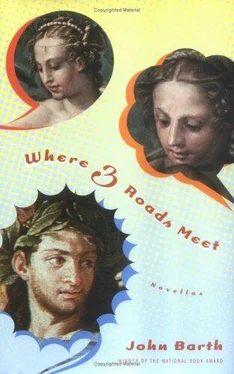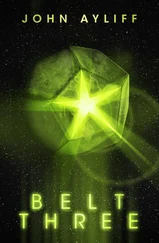Et cetera, blah blah blah.
It was in pursuit of this latter question, Dr. Dickson's letter went on (and on and on), that his attention had lately been brought to a more recent work of "experimental" fiction: a novella-length piece called Wye, by one C. Ella Mason (an author previously unknown to him), featured in the Spring 1999 issue of his (and our) university's literary quarterly, The Arundel Review. Ms. Mason's story (as he presumed I knew, its author happening to be my daughter) is a roman à clef concerning the dismissal in 1974 of two respected faculty members of the "Annapolis School for Girls" (a transparent alias for the Severn Day School, Listener, where Aggie and I so loved our years of teaching) on the grounds that twenty years earlier they had worked as prostitutes to earn their tuition at "Wye College," in the course of which enterprise they had met, serviced, and, it seems, inspired a budding young writer named "Fred," of whom more presently.
The teachers in question are a long-standing member of the "ASG" English Department named "Mrs. Woodsman" and her sister, a more recently hired theater and gymnastics coach; the scandal of their past comes to light when the former's husband discovers, in 1973, diaries kept by his wife from the late 1940s, before their marriage, through the following decade (in the course of which they had wed and bred) and into the early 1960s. They reveal to him not only his wife's shocking premarital past, of which he was altogether unaware, but also that in the seven years from 1955 to 1962 she had "maintained a relationship" (also unknown to him) with the aforementioned "Fred," who by then had blossomed into the up-and-coming avant-garde novelist "Frederick Manson": a period extending from the conception of his controversial erotic trilogy The Graces through its initial publication and its author's termination from the faculty of "Wye College," whereto he had returned as writer-in-residence. The scandalized husband — a conservative country-club-Republican dealer in suburban D.C. commercial real estate named "Ed Woodsman" — successfully presses for divorce and custody of the couple's two late-teenage children despite his mate's honest protestations that her past is past; that throughout her marriage she has been an exemplary wife and mother; that her "relationship" with Adjunct Professor "Man-son" had been exclusively editorial, assisting him with the research and composition of his subsequently world-famous and unjustly maligned masterwork, which in her admittedly subjective opinion bade to be to the century's second half what James Joyce's Ulysses (similarly banned as "obscene" until District Court Judge John M. Woolsey's landmark 1933 ruling to the contrary) was to its first. In sum, that she is reprehensible only in having kept from her husband her early sexual history and her subsequent, altogether non sexual connection with "Frederick Manson," on the grounds that her dear dour spouse was incapable of understanding, much less of forgiving, those omissions.
The family court judge (so went C. Ella Mason's Wye novella, insofar as the letter writer could follow its story line through its off-putting postmodernist narrative devices) is unimpressed; likewise the headmistress and trustees of the Annapolis School for Girls, much as they value Mrs. Woodsman's long and distinguished service to that institution and her more recently appointed but comparably popular sister's as well (had they known about Aggie's activities between her college days and her Severn Day School appointment, Listener, there'd have been even more hell to pay!). The two women lose their jobs; the Annapolis School girls lose the best teachers they'll ever know; Mrs. Woodsman loses official custody of her children (but not their love, understanding, and sympathy, declares Wye's first-person narrator); she loses, too, her beloved-though-stuffy husband, first to the divorce that he insists upon, and soon after to his death by suicide, humiliated by the public scandal that he has himself precipitated. American literature, moreover, has by the present time of the Wye story long since lost to alcohol and despair the novelist "Frederick Manson," whose wife divorces him after his sacking from "Wye College." Concerning all which losses, the un- named narrator of Wye asks of herself and of the reader (in a perhaps over-heavy closing-line pun), Why?
While reserving judgment on the literary merits of Ms. Mason's lengthy short story, Manfred F. Dickson Jr. — the writer of this interminable letter of introduction, in case Listener has forgotten — declared himself to have been struck indeed by the obvious parallels between his father and "Frederick Manson,"as between The Fates and "The Graces," not to mention by the novella's echoing, in its title and in numerous elements of its construction, his father's signature preoccupation with, among other things, Y's. He had therefore promptly sought out its author, herself an adjunct professor of creative writing at a branch campus of the state university on Maryland's Eastern Shore; had introduced and identified himself; and had pressed her for details of the backstory of Wye. No doubt to protect her family's privacy, Ms. Mason — a quite pleasant woman about the same age as himself, he was pleased to report, who asked to be called Cindy — had insisted that her fiction was just that, pure fiction, although she readily acknowledged its echoing of themes and motifs from The Fates. She denied likewise any connection with or knowledge of the "Gracious Masons" of that trilogy's dedication, while admitting that the coincidence of her last name and those dedicatees' had been one inspiration of her novella. Unconvinced, but not wanting to press the subject against her wishes (Ms. Mason having been otherwise most hospitable to him, respectful of his father's literary accomplishment — to which she would not presume to compare her modest own — and particularly sympathetic in the matter of parental divorce and loss of sire), he then took it upon himself to computer-search her background and was not long in tracing her parentage, the essential similarities (but with important differences, Lis- tener) between Mr. and Mrs. "Ed Woodsman" 's history and that of Ned and Grace Mason Forester, and the latter's present address.
Having discovered which last (right under his nose, it turned out, in the Arundel U. alumni directory!), he earnestly hoped that she might grant him and "contemporary Dickson scholarship" the privilege of an extended interview on the details of her collaboration with his father: nothing indiscreet, she was to understand (the erotic, he declared, was "frankly not [his] cup of tea"), but perhaps the illumination of such questions as those mentioned earlier, and even of such relative details as why Clotho (the first of the Fates novels, dealing with the hero's birth, boyhood, and discovery of his vocation) is emblemized on its title page and chapter headings with an inverted equiangular Y (i.e.,  ), the second (Lachesis, the saga of the hero's serial labors) with the Y upright, and the third (Atropos, the story of his fall from favor and his mysterious end) with the emblem turned ninety degrees clockwise (
), the second (Lachesis, the saga of the hero's serial labors) with the Y upright, and the third (Atropos, the story of his fall from favor and his mysterious end) with the emblem turned ninety degrees clockwise (  ).
).
Might they, at her convenience, meet and talk? And if so, could she kindly supply him with driving directions to Bern-bridge Manor, as he had tried in vain to find the town of Bernbridge both on his computer and on his AAA map of Maryland/Delaware/Virginia? …
TAPE 2
Читать дальше

 ), the second (Lachesis, the saga of the hero's serial labors) with the Y upright, and the third (Atropos, the story of his fall from favor and his mysterious end) with the emblem turned ninety degrees clockwise (
), the second (Lachesis, the saga of the hero's serial labors) with the Y upright, and the third (Atropos, the story of his fall from favor and his mysterious end) with the emblem turned ninety degrees clockwise (  ).
).










